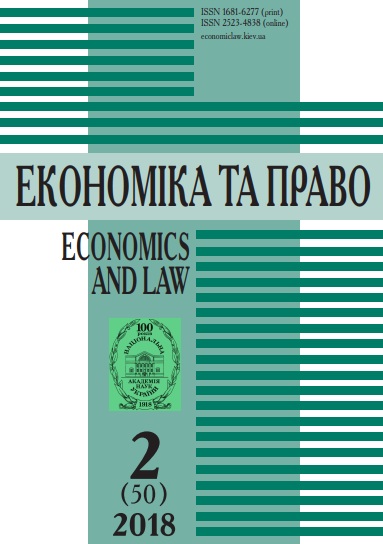INTERCEPTION OF CONTEMPORARY THEORIES OF MANAGEMENT AND SUSTAINABLE DEVELOPMENT CONCEPT
DOI:
https://doi.org/10.15407/econlaw.2018.02.132Keywords:
management, sustainable development, lean management, gig-economics, employee value propositionAbstract
The paper affirms that the development of modern management is based on the aspiring of long-term balance between all components and efficient use of resources. At present, it is impossible to build continuous success without entrepreneurship that includes design of new ideas within the organization. The author underline that the goals of sustainable development in Ukraine create a new system of mutually agreed management measures for economic, social and environmental (environmental protection) spheres focused on building public relations on the basis of trust, solidarity, equality of generations, and a secure environment. The basis of sustainable development is the inalienable human right to life and full development. Researcher states that the enterprises (organizations) are developing under the influence of direct and indirect incentives that consonant to ideas of sustainability as a parity of economic, and also under the pressure of legal requirements. The author insist that increasing labor mobility, facilitating access to information and increasing its distribution opportunities, while reducing the ability to control information flows (in particular, consumer and employee feedback), reducing the cost of shipping many goods and other factors that make consumers and workers less dependent on a particular manufacturer (employer), forcing enterprises to rethink management and makes it more sensitive to changing the outlook of society. The author conclude that there is no correct answers to the question of which management theory is correct and how to properly manage an enterprise (e.g. the value proposition of the employer and the common economy can be effective in different industries, but may include one another). At the same time, the key idea for success can be formulated in the spirit of the concept of sustainable development - a harmonious combination of economic, social and environmental components of development that does not exhaust natural and human resources and, therefore, will be able to last a long time.
References
Butlin J. Our common future. By World commission on environment and development. Journal of International Development. 1987. Vol. 1 (2). P. 284-287. doi: https://doi.org/10.1002/jid.3380010208
Smachylo I.I. Pryntsypy formuvannia ta struktura mekhanizmu upravlinnia stalym rozvytkom pidpryiemstva. Ekonomika rozvytku. 2013. No. 3 (67). S. 79-82 [in Ukrainian].
Pererva P.H. Innovatsiina, investytsiina ta marketynhova polityka — antykryzovi instrumenty staloho rozvytku pidpryiemstva. Visnyk Natsionalnoho tekhnichnoho universytetu "Kharkivskyi politekhnichnyi instytut": zb. nauk. pr. (ekonomichni nauky). 2017. No. 46 (1267). S. 78-82 [in Ukrainian].
Illiashenko S.M., Kolodka A.V. Rol imidzhu u zabezpechenni staloho rozvytku promyslovykh pidpryiemstv. Stalyi rozvytok — XXI stolittia: upravlinnia, tekhnolohii, modeli. Dyskusii 2016. Cherkasy: vydavets Chabanenko Yu., 2016. S. 522-535 [in Ukrainian].
Bendell J. Terms for endearment: Business, NGOs and sustainable development. London: Routledge, 2017. 280 p. doi: https://doi.org/10.4324/9781351282727
Waddock S., McIntosh M. SEE change: Making the transition to a sustainable enterprise economy. London: Routledge, 2017. 202 p. doi: https://doi.org/10.4324/9781351278645
Kolk A. The social responsibility of international business: From ethics and the environment to CSR and sustainable development. Journal of World Business. 2016. Vol. 51 (1). P. 23-34. doi: https://doi.org/10.1016/j.jwb.2015.08.010
Zharova L.V., Kakutych Ye.Iu., Khlobystov Ye.V. Ekolohichne pidpryiemnytstvo ta ekolohizatsiia pidpryiemnytstva: teoriia, orhanizatsiia, upravlinnia. Za nauk. red. B.M.Danylyshyna. Kyiv-Simferopol, 2009. 240 s. [in Ukrainian].
Management. Oxford dictionary (online version). URL: https://en.oxforddictionaries.com/definition/management
Taylor Frederick W. Scientific management. The Sociological Review. 1914. No. 7.3. P. 266-269. doi: https://doi.org/10.1111/j.1467-954X.1914.tb02387.x
Price Brian Frank and Lillian Gilbreth and the Manufacture and Marketing of Motion Study, 1908-1924.
Business and economic history, Second Series (On-line resource). 1989. Vol. 18. URL: http://web.mit.edu/allanmc/www/TheGilbreths.pdf
Hamel G. The Future of Management. Harvard: Harvard Business School Press, 2007. 432 p.
Adizez I. Idealnyi kerivnyk. Chomu nym nemozhlyvo staty. Kyiv: Nash Format, 2017. 288 s. [in Ukrainian].
Peter Drucker. The Essential Drucker: The Best of Sixty Years of Peter Drucker’s Essential Writings on Management. New York: Collins Business Essentials, 2008. 358 p.
The Future of Jobs Employment, Skills and Workforce Strategy for the Fourth Industrial Revolution. 2016. URL: http://www3.weforum.org/docs/WEF_FOJ_Executive_Summary_Jobs.pdf
Minchington B. Employer Brand Leadership. Australia: A Global Perspective, Collective Learning Australia, 2010. 124 p.
Doslidzhennia "Naikrashchyi robotodavets" Shchorichne opytuvannia studentiv ta kandydativ z dosvidom roboty 2017.EY.com. URL: https://www.ey.com/Publication/vwLUAssets/ey-best-employer-brief-guide-ukr/$FILE/ey-best-employer-brief-guide-ukr.pdf [in Ukrainian].
What is the Employee Value Proposition? URL: https://www.cebglobal.com/insights/employee-value-proposition.html
Introduction to EVP CEB’s Employment Value Proposition Framework. CEB Corporate Leadership Council. URL: https://www.cebglobal.com/content/dam/cebglobal/us/EN/insights/evp/pdfs/introduction-to-evp-full.pdf?pageRequestId=a2384781-cc27-4dbc-a2b4-e51c32a0885a
Employer Branding Report 2017. Practice Managers Australia. URL: https://www.practicemanagersaustralia.com.au/media/Practice-Managers-AU/EmployerBrandingReportSpread.pdf
How to Strengthen Your Reputation as an Employer. Harvard Business Review. URL: https://hbr.org/2018/05/how-to-strengthen-your-reputation-as-an-employer
US gig economy: data shows 16m people in "contingent or alternative" work. The Guardian. URL. https://www.theguardian.com/business/2018/jun/07/america-gig-economy-work-bureau-labor-statistics
Kolos I., Hrechan A. Etapy rozvytku kontseptsii oshchadlyvoho vyrobnytstva ta osoblyvosti yii adaptatsii do natsionalnykh ekonomik. Zhurnal yevropeiskoi ekonomiky. 2016. Vol. 15. No. 4. S. 455-467 [in Ukrainian].
Lean enterprise institute. URL: https://www.lean.org/WhatsLean/
Hopp W., Spearman M. Factory Physics: Foundations of Manufacturing Management. 3rd ed. 2008. URL: http://www.factoryphysics.com/
What VUCA Really Means for You. Harvard Business Review. URL: https://hbr.org/2014/01/what-vuca-really-means-for-you
Pasmore B., O’Shea T. Leadership agility: A business imperative for a VUCA world. People and Strategy. 2010. Vol. 33. P. 4-32.
Global Human Capital Trends 2017. URL: https://www2.deloitte.com/content/dam/Deloitte/ua/Documents/human-capital/Deloitte-Global-Human-Capital-Trends-2017-10.pdf


